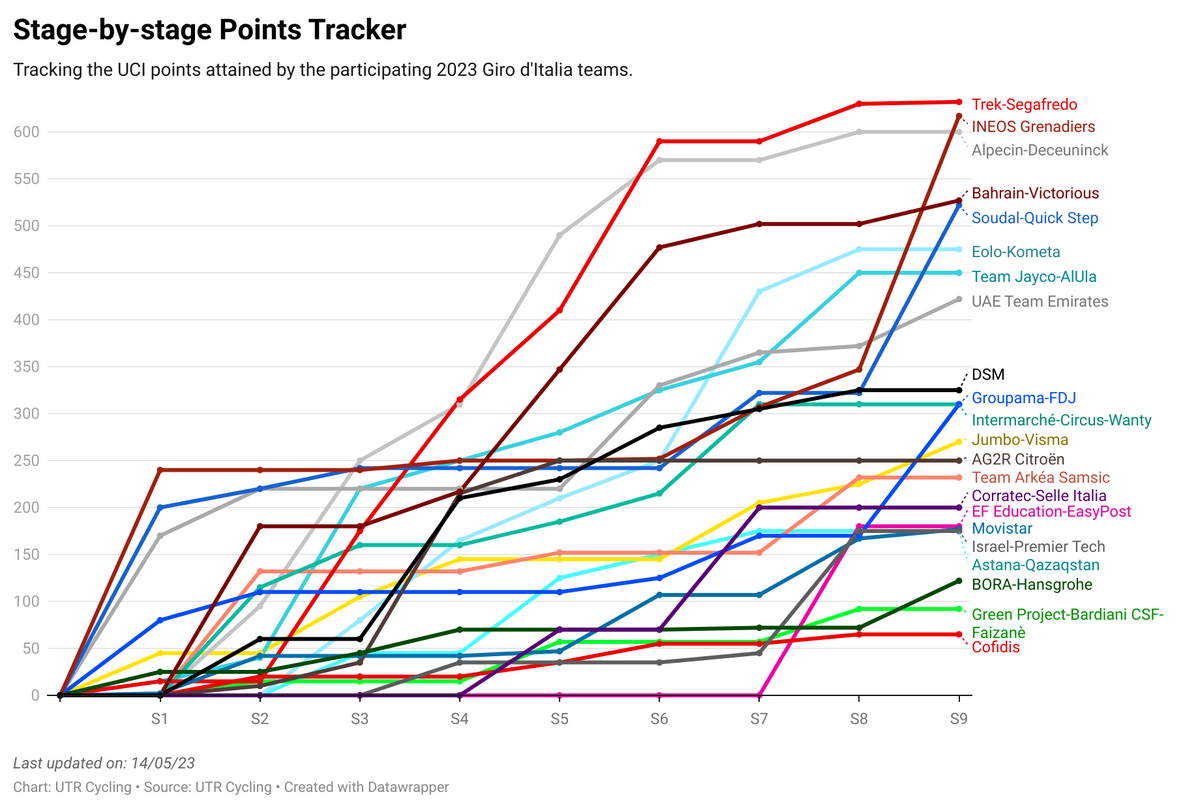Giro Report: Week 1

After a week that started and finished with time trial victories for Remco Evenepoel, we analyse notable team performances and look at how the new points system has given more adjusted value to Grand Tour stage victories compared to the old system.
Despite only picking up one stage victory, the rankings show that Trek-Segafredo have been the best team so far this Giro. Although they have primarily relied on Pedersen's points, Skujiņš and Ghebreigzabhier picked up points as part of Stage 4's successful breakaway. Next week promises to deliver more points for the American team, with multiple opportunities for Pedersen to win from reduced bunch finishes and further breakaway opportunities for Skujiņš and Ghebreigzabhier, on Stage 12 and 15. Skujiņš in particular will be looking to amend his ill-timed crash on Stage 8, which prevented him from catching Healy on the descent of Il Cappuccini.
In spite of their ProTour status, Eolo-Kometa have enjoyed a strong first 9 stages, including victory atop Gran Sasso with Bais. Sitting 6th in the current Giro standings, they are the best invitee team so far and with more opportunities for breakaway success in the second week through Albanese or Fortunato, they look set to pick up more points next week.
After a poor start to their season, Jayco-AlUla have been very impressive so far, picking up points on the first eight stages, and placing a rider in the top 10 of every road stage, as the graph below illustrates.
Such an impressive start, coupled with Groenewegen's victory in Hungary, has lifted the Australian side out of the relegation zone. The new iteration of the UCI points system has enabled this, since results in stages of Grand Tours are now more valuable, and points are awarded to the top 15.
Let's not forget: their tally could have been more if De Marchi and Clarke had cooperated for 300m more on Stage 6. Coming up next week, Matthews should have more chances either through breakaways or reduced bunch sprints. Zana, Scotson and De Marchi have all looked strong this week, and should be given freedom to get in large breakaways on intermediate stages. Alongside a consistent GC performance by Dunbar thus far, Jayco should be looking at taking a large number of points over the next two weeks.
Surprising by their poor performances so far are Cofidis and BORA-Hansgrohe, who are the two lowest WorldTour ranked teams. So far, Cofidis' highest stage placing is 11th through Consonni, who is responsible for 85% of their points. Considering their line up, this performance isn't altogether surprising, as their combined points tally so far this season is 250, with Consonni accounting for 187 of them.
BORA's absence from the pointy end for much of the week is less worrying for their fans, since the team is centred around strong GC showings for Vlasov and Kamna. What will be worrying though, is the poor performance of both their GC leaders on Stage 8, where they lost time to most of the GC favourites. We should get a stronger indication of their climbing form in the next week, particularly on Stage 13 and 15.
Let's take a closer look at how the points awarded for GC placings differ in the old and new systems.
This graph shows a greater appreciation of Grand Tours compared to the old system. An increase in points in monuments and WorldTour stage races means that less value is gained from participating in smaller races, which was a major criticism of the old system. Notably, the adjusted value of a stage win at the Giro has increased: under the old system, a stage victory was equivalent to 12th place overall. However, under the new system, a stage victory is now equivalent to 10th. If a rider is around the top 20 overall but could win a mountain stage if they saved energy and lost time (enabling them to be allowed in the break by the GC teams), teams could opt to sacrifice their GC chances to try to win a stage.
The new system is particularly rewarding for riders not capable of a GC result, but capable of winning multiple stages, such as sprinters. Thus, there is greater value in building a full squad around a sprinter as two stage wins is now better than finishing 7th overall. This means that sprinters who primarily base their calendar around Grand Tours, such as Groves or Pedersen, deliver greater value than in the past.
Next week, the riders take on multiple transitional stages that could end with reduced bunch finishes or breakaway victories. Stage 13 and 15 could provide some GC action, but in typical Giro fashion, it should all come down to the final week.
Enjoy the rest day.
